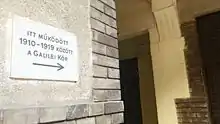Galileo Circle
The Galileo Circle (Galilei Kör) was an atheist-materialist student organization that functioned in Budapest between 1910 and 1919. It was based in Anker Köz.[1]

The circle was founded on November 22, 1908.[2] This was in response to the attacks on Gyula Pikler, a social scientist who had suggested that the nation was a social phenomenon which arose through a social and historical process, rather than an eternal entity. This led to him being attacked by Hungarian Christian nationalists.[2] It claimed to be specifically apolitical and declared itself in favour of self-education and science. Endre Ady described the galilesists as the ‘young army of Fever’, dedicating various poems to the Circle. Oszkár Jászi thought the galileists would help lead Hungary from ‘the Balkans into Western Europe’.[1]
The organisation was banned in January, 1918, a period of labour unrest in the Austro-Hungarian Empire. However following the Aster Revolution in October 1918 it was relaunched. It was finally dissolved on 21 March, shortly following the establishment of the Hungarian Soviet Republic.[1]
The circle published Szabadgondolat.[3]
Participants
References
- Csunderlik, Péter Tibor. "The history and reception history of the Galilei Circle (1908-1919)" (PDF). elte.hu. ELTE Faculty of Humanities. Retrieved 28 November 2018.
- Csunderlik, Péter (21 November 2013). ""Titkos társulat zsoldján kitartott bárgyú eszmezavarosok"? - 105 éve alakult a Galilei Kör". Múlt-kor történelmi magazin (in Hungarian). Múlt-ko. Retrieved 28 November 2018.
- Péter, Csunderlik. "Death instead of life – Activities of the Galilei Circle in the first two years of the world war | Frontlines and Hinterland". elsovh.hu. Retrieved 28 November 2018.
- "Magyar Életrajzi Lexikon 1000-1990". mek.oszk.hu. Hungarian Electronic Library. Retrieved 28 November 2018.
- Judit Meszaros, 'Ferenczi and Beyond. Exile of the Budapest School and Solidarity in the Psychoanalytic Movement During the Nazi Years', Routledge, 2014, ISBN 978-1782200000 p.68.